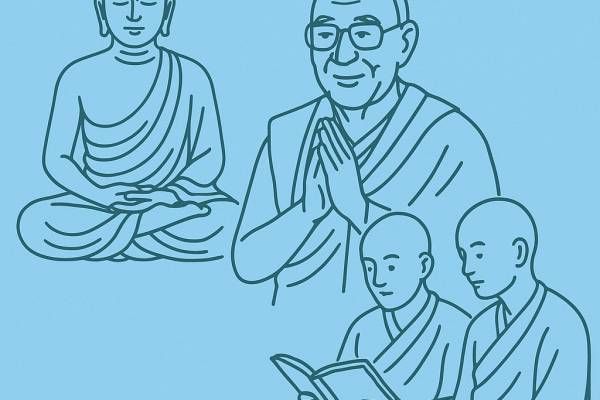
Rebirth & Karma in the Modern World: Can You Believe in Them Today?
What Is Rebirth in Buddhism? In Buddhism, rebirth is not the same as reincarnation. When people search for “rebirth vs reincarnation,” they’re often confused by how the two differ. Buddhism teaches that there is no permanent soul or self (anattā) that migrates from one life to the next. Instead, consciousness continues through causes and conditions (paticca samuppāda). “It is volition, monks, that I call kamma; for having willed, one acts by body, speech, and mind.” — Anguttara Nikāya 6.63 This means what we call “you” is actually a dynamic stream of mental formations, habits, and actions, not a static self. Rebirth is the continuation of that stream — conditioned by kamma (Pāli for karma). Is Rebirth Scientific? Can You Believe in Rebirth Today? A common Google search today is: “Can you believe in rebirth in the modern scientific world?” And the answer is — you don’t need to suspend reason to consider the Buddhist view. While Buddhism does not depend on blind faith, it invites deep contemplation. The Buddha encouraged inquiry: “Do not go by reports, by legends, by traditions… but when you know for yourselves: ‘These things are wholesome…’ then accept them.” — Kalama Sutta (AN 3.65) In recent decades, researchers like Dr. Ian Stevenson and Dr. Jim Tucker from the University of Virginia studied thousands of verified cases where children remembered past lives with striking accuracy — including names, locations, and causes of death. These scientifically documented cases of rebirth are now frequently searched online, especially under terms like “proof of reincarnation” or “scientific evidence for rebirth.” Although science has not definitively proven rebirth, it has not disproven consciousness beyond brain activity, either — leaving room for exploration. What Is Karma in Buddhism? (And What It’s Not) When people type “What is karma in Buddhism?” into Google, they’re often met with confusing or misleading answers. Let’s be clear:Karma is not fate, and it is not divine punishment. In early Buddhism, karma means intentional action — and its ethical consequences. “Intention, I tell you, is kamma.” — Anguttara Nikāya 6.63 Everything we think, say, or do shapes our future. This includes not only our external circumstances but also our internal landscape — our thoughts, emotions, and tendencies. Modern psychology now echoes this with studies showing that habits shape the brain. This is why Buddhism and neuroscience is a trending search — people want to understand how karma connects to mental patterns, neuroplasticity, and personal transformation. So, if you’re wondering, is karma real?, the Buddhist answer is simple: karma is not some invisible cosmic retribution, but a natural law of cause and effect rooted in ethical intention. How Rebirth and Karma Affect Daily Life You don’t have to be a monk or scholar to see how karma works in everyday life. People who search for “how karma affects your life” or “how to create good karma” are looking for actionable, real-life insight. Here’s the Buddhist view: In this way, rebirth happens moment to moment — not just after death. This idea of psychological rebirth is especially powerful in the modern world. “With our thoughts, we make the world.” — Dhammapada 1:1 Can I Be a Buddhist Without Believing in Rebirth? This is one of the most asked questions on forums like Quora and Reddit:“Can I be a Buddhist without believing in rebirth?” Yes — many people today identify as secular Buddhists or practical Buddhists, applying mindfulness, ethics, and meditation to daily life without necessarily accepting rebirth literally. However, even a metaphorical understanding of rebirth — as the unfolding of habits, choices, and consequences — still holds great value. For example, the Dalai Lama has said: “Whether you accept rebirth or not, it is important to live a life of compassion, non-violence, and responsibility.” Buddhism, Karma, and the Brain There’s growing interest in the overlap between Buddhist psychology and modern neuroscience. Searches like “Buddhism and the mind,” “karma and brain science,” and “meditation rewires the brain” have skyrocketed in recent years. Buddhist teachings on mental formations (saṅkhāra) and habitual patterns closely mirror what we now understand through neuroplasticity. In simple terms: repeated thoughts and actions shape your brain — just like karma teaches. “All experiences are preceded by mind, led by mind, made by mind.” — Dhammapada 1:1 This is karma in real time. You’re constantly shaping your consciousness. 🧭 Final Reflection: Why Rebirth and Karma Still Matter Today In an age dominated by instant gratification, AI, and materialism, Buddhist ideas like rebirth and karma remind us to pause, reflect, and take responsibility for our lives. They offer: Whether taken literally, metaphorically, or philosophically, these teachings encourage a life of mindfulness, compassion, and accountability. “Just as a seed produces fruit, so too does intentional action bear results.” — Majjhima Nikāya 57


